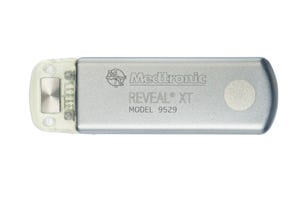Dialysis Patients Can Benefit From Heart Monitoring
Hemodialysis patients who are at risk of abnormal heart rhythm can benefit from long term cardiac monitoring, according to a small study from Medtronic.
November 17, 2014

Medtronic unveiled results of a small study last week that shows that dialysis patients can benefit from continuous heart monitoring.
A majority of dialysis patients - 52% - who were implanted with Medtronic's Reveal XT Insertable Cardiac Monitor reported atrial fibrillation symptoms with 22 out of 50 patients recording a total of 1,640 episodes of atrial fibrillation that were six minutes or longer. That rate of AF was nearly four times higher in the 12 hours after a dialysis treatment.
|
Medtronic's Reveal XT, a subcutaneous cardiac monitor |
The Reveal XT is an insertable heart device that is placed under the chest skin and can detect abnormal heart rhythm for up to three years.
The MiD Study monitored abnormal heart rhythm in 50 end-stage renal disease patients at eight sites during a six-month period.
Aside from patients experiencing AF, the Reveal XT cardiac device also found that 19 of 50 patients had at least one bradycardia episode (in which heart rates slow down) , with a rate of 26 bradycardia events per patient month. In the follow-up period, there were only two sustained ventricular arrhythmia episodes during the follow-up, according to a news release from Medtronic. This has led to five patients receiving pacemakers after bradycardia was detected.
"It has been known that patients with end-stage renal disease are at significant risk for cardiac arrhythmias and sudden death. While it has been assumed that fluid and electrolyte imbalances are key contributors to the development of arrhythmias, other factors, including ventricular hypertrophy and cardiac fibrosis, also may exacerbate the underlying risk,” said study co-author Dr. James A. Tumlin, professor, Renal Division at the University of Tennessee College of Medicine. “The data presented today underscore the high prevalence of arrhythmias in ESRD patients, as demonstrated by this technology, and suggest a need for intensive monitoring.”
The news release from Medtronic also points to a broader recognition of collaboration among physicians with different specialities treating co-morbidities.
"The MiD study shows how nephrologists and cardiologists can work together to treat patients who are undergoing dialysis,” said Ven Manda, vice president of Medtronic Renal Care Solutions. “The study results give us crucial insight on the timing, frequency and types of abnormal heart rhythms experienced by these patients – especially as it relates to the delivery of dialysis – and these findings may affect how dialysis treatments are delivered in the future."
Currently, the Holter monitors are the gold standard used to detect and diagnose abnormal heart rhythm, but they can only worn for two days and don't allow for any long term monitoring. Also, patients can't shower with them and there are cumbersome leads to have to manage leading to a less-than-stellar compliance rates.
Medtronic's Reveal aims to be a long-term more comfortable cardiac monitor for patients. But it's not the only company looking to provide cardiac monitoring that doesn't interfere with patients' everyday lives.
San Francisco-based iRhythm Technologies has developed the FDA-cleared Zio XT wearable patch that like a band-aid can be worn on the skin to monitor the heart and collect information on any abnormal rhythm. The patch can be worn for up to 14 days.
-- By Arundhati Parmar, Senior Editor, MD+DI
[email protected]
You May Also Like



